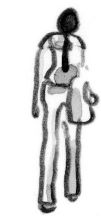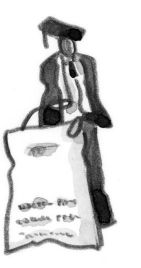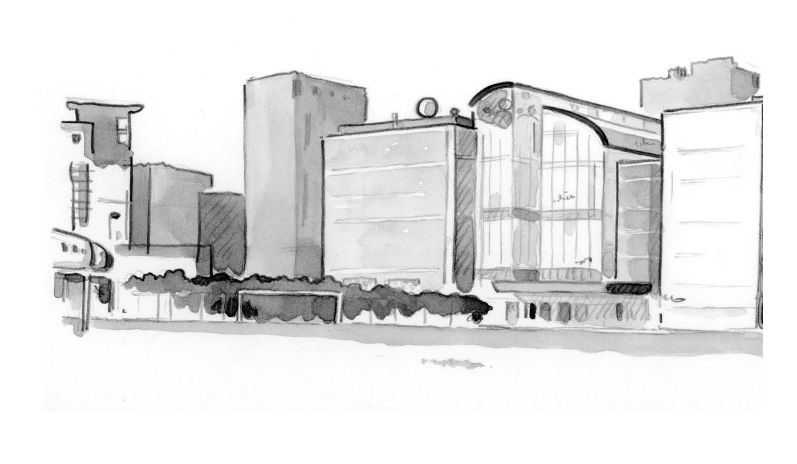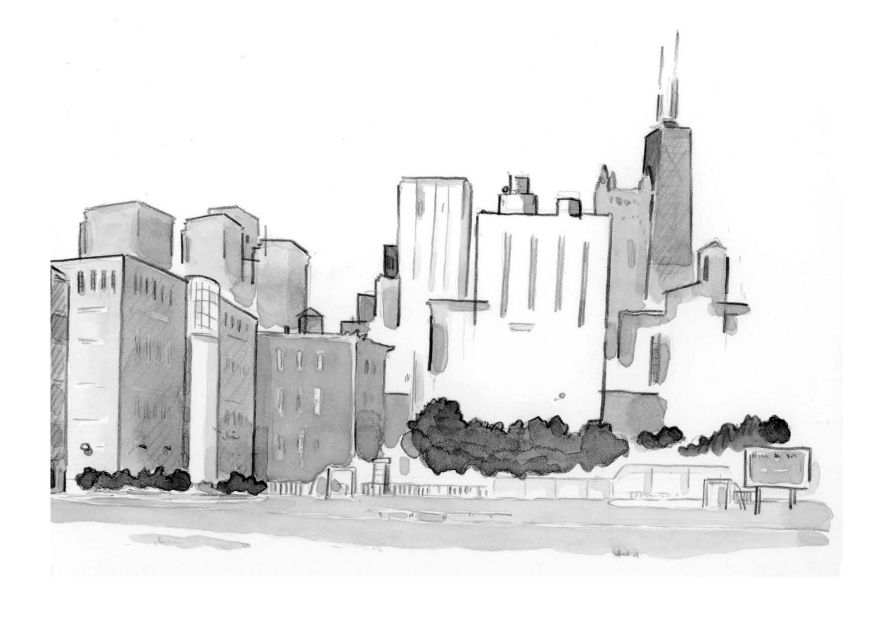Ridiculous/Hilarious/Terrible/Cool (29 page)
Read Ridiculous/Hilarious/Terrible/Cool Online
Authors: Elisha Cooper

Daniel and Emily swoop past not holding hands, he looking elegant in black tails, she looking uncomfortable in a dress. Diana is on the dance floor with one of her lifeguard coworkers. Aisha sits at a back table with her date from Prowa/Peoria, a little smile on her face. Anais shuffles past in a slender green dress, Maya clutching her arm. They're laughing. They've both ditched their dates. The boy from Minnesota couldn't come. Ben&Andy decided not to come either.
After all the talk surrounding promâwho was going with whom, what everyone was wearing, how they were getting there, where they were going before, when they were arriving exactly, why was she
really
going with himâthe most exciting part of prom
was
the talk. As the students sit around the ballroom on upholstered chairs, sipping at glasses of melting ice, stumbling onto the floor for a dance, the night becomes anticlimactic. Is this it? Yes, it is.
really
going with himâthe most exciting part of prom
was
the talk. As the students sit around the ballroom on upholstered chairs, sipping at glasses of melting ice, stumbling onto the floor for a dance, the night becomes anticlimactic. Is this it? Yes, it is.
Despite this, everyone's talking about the parties after prom.
Mr. Dyson struts across the field next to the school. He's wearing plaid pants, pointy leather shoes, a puffy paisley hat, and water goggles. On top of this getup he's wearing a graduation robe. If there were a high school for pimps, and they had commencement, Mr. Dyson could be the valedictorian.
As he swaggers across the field, students stare.
“I
dare
ya'll to dunk me!” Mr. Dyson croons. “Who wants some!”
dare
ya'll to dunk me!” Mr. Dyson croons. “Who wants some!”
Most students do. They file behind him pied piper style, drawn by the fact that a good teacher can also be cool. Well, not that cool.
“My name is
The Untouchable,
baby!” he bellows at the now sizable crowd gathered around him, before mounting the seat of the dunk tank and being dropped into the water with one of the first throws.
The Untouchable,
baby!” he bellows at the now sizable crowd gathered around him, before mounting the seat of the dunk tank and being dropped into the water with one of the first throws.
It's field day. Around the field are tables with ice cream, tables with donuts, the dunk tank, a stage with the second-place act from the talent show. In the middle of the field are games of volleyball, bocce, and soccer. Anyone not playing is running around squirting water on other people's shirts.
Walking across the field, floating above the silliness, is Maya. She's wearing leather sandals and jeans, a low-cut green top. A blue band holds back her hair. She looks almost sophisticated, older than even a week ago. She's debriefing with some friends about prom.
“Who dressed you?” she jokes. Maya herself wore a light blue dress from BCBG. The friends agree that prom was fun, but not too fun. There were the usual dramas: a limo that never came, a corsage that fell apart. As the girls talk, a small boy walks up and asks Maya to sign his yearbook.

“I'll catch you
later,
” she says, in jokey celebrity mode, flashing him a bright smile. He shrinks away.
later,
” she says, in jokey celebrity mode, flashing him a bright smile. He shrinks away.
After prom, Maya and Anais and other friends went to somebody's house. The girls danced. The boys didn't. In the morning the somebody's parents made everyone breakfast. No one slept.
Maya's friends head off across the field to get something to drink. She talks about the upcoming months. Over the summer she will work at Nordstrom and at the Lookingglass Theatre. In the fall, she will fly to New York and NYU. She will audition for plays, audition for films. She can't wait.

Her entire year has brought her to this: a feeling that is almost overwhelming, building with anticipation, swelling with the knowledge that the opportunities of the world will soon be laid in front of her. Tomorrow is almost here. Who knows, someday she will star in that movie she's always dreamed about, with Wes Anderson directing.
I
And with that, Maya sticks her tongue into her cheek and laughs.
And with that, Maya sticks her tongue into her cheek and laughs.

A summer storm kicks up from the west, whipping dirt into the air and turning the afternoon dark. On Pulaski Avenue on the city's West Side, cars have turned on their lights. In the backyard of the Martinez home, tables are moved to the garage, containers of food carried under the lee of the garage's roof, beach umbrellas folded down. Diana's graduation party may be in some danger.
As everyone waits for the storm's inevitable arrival, Diana's mother keeps handing out the plates of beef and rice and salsa she spent the whole week cooking. Diana's beaming father keeps serving bottles of beer and
Jarritos
soft drinks. Diana's sisters sit around. Diana's little brother chases Diana's nephew under the tables. Diana's older brother, back from jail and busting out of a white tank top with a cigarette behind each ear, lifts visitors off the ground with back-thumping hugs. The family eats and listens to the Mexican dance music pumping like thunder. In the middle of all this commotion, Diana plays host, her smile never leaving her face for an instant.
Jarritos
soft drinks. Diana's sisters sit around. Diana's little brother chases Diana's nephew under the tables. Diana's older brother, back from jail and busting out of a white tank top with a cigarette behind each ear, lifts visitors off the ground with back-thumping hugs. The family eats and listens to the Mexican dance music pumping like thunder. In the middle of all this commotion, Diana plays host, her smile never leaving her face for an instant.
She takes visitors for a tour of her house: the family room and kitchen, the apartment she shares with her sisters, the bedroom where her bed touches three of the room's walls, the aquarium with the turtle squatting motionless in a pool of water.
“Yes,” she says, the word coming out with none of the tentativeness from earlier in the year. “That's a small snapping turtle.”
Diana walks back to the yard. The wind has died down, the storm has passed over.
Later that evening, Diana's older brother wants some of his friends to come to the party. The rest of the family does not. Diana negotiates with her mother, trying to prevent an explosion. Then her lifeguard friends show up, along with friends from the neighborhood, along with friends from high school. They all sit at separate tables.
Diana walks back and forth, smiling and trying to keep everyone happy. As she makes her way between the tablesâa part of this group, apart from that groupâit's clear that navigating the shoals of these waters will never be easy.
Next year can't come too soon.
Downtown, the Harris Theater. Parents with flowers, grandparents with camcorders, siblings with no desire to be here. Everyone dressed up and looking good except for the odd uncle wearing a Cubs hat. It's come to this: graduation.
The concert band starts “Pomp and Circumstance” but the families don't stop talking. If anything, they talk louder so they can be heard over the music. Then the soon-to-be-graduates march in, wearing around their necks orange hoods so bright that if they all wanted to work alongside the interstate after the ceremony they could. They jam the aisles, waving at the crowd. Someone shouts,
“Adrienne!”
The Payton faculty saunters in their colorful hoods, boards worn at goofy angles. Commencement commences.
“Adrienne!”
The Payton faculty saunters in their colorful hoods, boards worn at goofy angles. Commencement commences.

Maya calmly leads the crowd in the Pledge of Allegiance. Daniel shouts out some welcoming words. Diana introduces a segment on courage. Then, for what seems like an entire year, everyone endures the twenty-five speakers, five songs, one video, a mind-numbing mess of affirmation. Truisms, wrapped around anecdotes, wrapped around maxims. Words like
purpose
said so many times that the word becomes meaningless, said so many times in fact that it starts sounding funny: “Purpose, purpose, purpus, purpes, porpis, porpoise.”
purpose
said so many times that the word becomes meaningless, said so many times in fact that it starts sounding funny: “Purpose, purpose, purpus, purpes, porpis, porpoise.”
Everyone in the theater is waiting for graduation to distill down to the one moment they came here for: their classmate, their friend, their son, their daughter, walking across the stage, a walk as short as the years of school have been long, to gather a diploma and then to keep going to the other side and quickly, slowly, joyfully, painfully out of their lives: Anais Blake. Maya Boudreau. Emily Harris. Diana Martinez. Daniel Patton. Aisha Kamillah Shaikh.
So let's leave these students now too. Leave them to their next chapter of who knows what. Leave them to change into whatever shape they choose or have chosen for them. And let's go back to the high school, back to where they started.
Two days after graduation, a trickle of underclassmen have come to Payton to pick up grades or drop off a book, to walk through the hallways past the trophy cases, the orange and blue banners, then back outside to friends waiting in cars still running.
“You gotta do anything else?”

“No.”
The building is quiet. Classrooms empty, lockers open, bulletin boards stripped clean, all showing that few things are as empty as an empty hallway at the end of a school year.
And yet, it is within these silent halls that the school waits for all that will come. For the students who will come in the next months, in the next years, in the next decades and beyond. All those students, all those years, ready to begin again.

Other books
Samantha James by The Seduction of an Unknown Lady
Santa's Executive by Ryan, Carrie Ann
El jardinero nocturno by George Pelecanos
The Merciless II by Danielle Vega
The Dawn Star by Catherine Asaro
The Reluctant Berserker by Beecroft, Alex
Clean Burn by Karen Sandler
The Delaney Woman by Jeanette Baker
Kathryn Smith by A Seductive Offer
Dear John by Nicholas Sparks